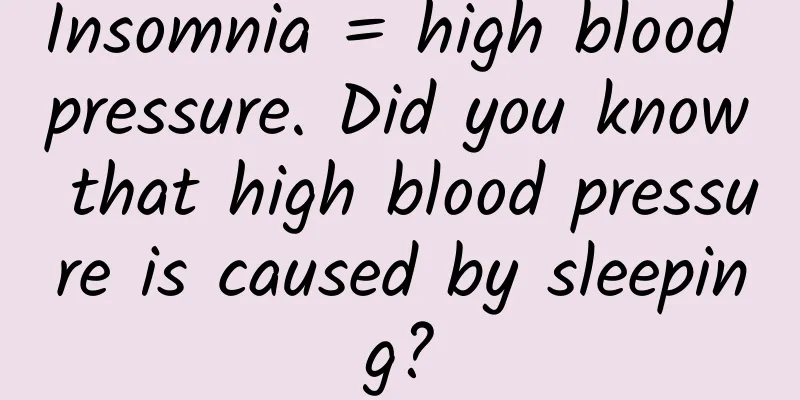Insomnia = high blood pressure. Did you know that high blood pressure is caused by sleeping?

|
Sleep problems are plaguing the entire human race in different ways. In 2024, a survey of 36,000 respondents in 17 markets around the world pointed out that only 13% of respondents worldwide said they slept well every night. Sleep is an instinctive need for human survival, and poor sleep can harm health. A study involving more than 400,000 people recently published in the European Heart Journal also found that short sleep time is associated with five cardiovascular diseases, including hypertension, pulmonary embolism, coronary heart disease, myocardial infarction and chronic ischemic heart disease. Insomnia = high blood pressure? Hypertension caused by insomnia is medically known as "sleep-disordered hypertension". Clinically, sleep disorders refer to the symptoms of patients having difficulty falling asleep, shallow sleep, waking up easily, having many dreams, waking up early, having difficulty falling asleep after waking up, feeling uncomfortable after waking up, fatigue or daytime sleepiness, and other manifestations of the normal rhythmic alternation of sleep and wakefulness, also known as sleep disorders. An analysis released at the 2024 American College of Cardiology Scientific Annual Meeting stated that insufficient sleep increases the risk of high blood pressure, especially in women . The analysis found that people who sleep less than 7 hours a night have a 2-3 times higher risk of high blood pressure than healthy people, and women have a higher risk of high blood pressure due to insufficient sleep than men. Sleep disorders are one of the important risk factors for hypertension. They are mainly caused by the excitement of the sympathetic nervous system, which causes the contraction of small arteries, increased peripheral vascular resistance, or neuroendocrine hormone imbalance at night, which causes high blood pressure. High blood pressure can directly or indirectly lead to dysfunction of the activity and inhibition of the cerebral cortex, resulting in continuous activation of the renin-angiotensin-aldosterone system, the sympathetic nervous system, etc., increased secretion of excitatory neurotransmitters, increased autonomic nervous activity, and increased release of inflammatory factors, which in turn affect sleep and aggravate sleep disorders. Long-term sleep disorders will increase the risk of hypertension. A study conducted by Xuanwu Hospital of Capital Medical University using polysomnography found that the worse the sleep quality, the higher the prevalence of hypertension in patients with sleep apnea. A study based on over 2 million nights of sleep data from more than 12,000 adults worldwide found that irregular sleep, including irregular sleep duration and irregular sleep and wake-up times, significantly increases the risk of high blood pressure. The study shows that even if the bedtime, mid-sleep time, and wake-up time are delayed by only about half an hour, the risk of high blood pressure will increase significantly. It can be seen that sleep quality and high blood pressure are in cahoots and affect each other. Many people will experience blood pressure fluctuations or increases the next day due to lack of sleep at night. Especially when they are in a bad mood or are exposed to various stimuli, sleep disorders are more serious, leading to a sudden increase in blood pressure and increasing the incidence and mortality of cardiovascular events. Are you unable to sleep at night because you have too many things to do or too much pressure? In 14 of the 17 markets surveyed, respondents said they sleep less than the recommended number of hours per night, let alone a good night's sleep. Even though time zones and cultures vary from country to country, the factors that affect sleep are similar for all people: According to the survey, the biggest factor is personal anxiety (42%), followed by work pressure (27%) and financial pressure (25%). For China, anxiety (52%) and work pressure (43%) are the main reasons for poor sleep quality among Chinese people, which also reflects that in recent years, the phenomenon of overtime work in China has even been generally institutionalized and seriously overtime in some industries. The popularity of "996" and "007" has overwhelmed many "workers". The tragedy caused by high-intensity overtime work is not new and rare. These "996" and "007" not only deprive employees of their due rest time, but also bring different degrees of stress and harm to employees physically and mentally. For example, being unable to fall asleep or waking up in the middle of the night and unable to fall asleep again will affect the mental state of the next day and lead to a vicious cycle. Not only stress, but short videos, games, and social media are also affecting people's sleep. As people are becoming more and more dependent on electronic products, many people say that watching videos and reading Weibo before going to bed has become part of their bedtime habits. Although many studies have shown that certain video content or blue light from the screen can affect sleep, many people still cannot get rid of the use of electronic products before going to bed. If you don’t get enough sleep, it doesn’t make much sense to sleep in on the weekends The Healthy China Action Plan (2019-2030) clearly states that we should pay attention to sleep health, ensure adequate sleep time every day, follow a regular work and rest schedule for work, study, entertainment, and rest, and pay attention to a regular daily routine. It is recommended that adults sleep an average of 7 to 8 hours a day. After all, only when you are full can you have the energy to lose weight, and only when you are full can you have the energy to get up! “So, if I don’t get enough sleep during the week, can I just sleep in on the weekends to make up for it?” This “taking money from one pocket to pay for another” sleeping method is not advisable! So how should we improve our sleep? Behavioral therapy for insomnia is now recommended as the first-line treatment for chronic insomnia. It mainly achieves the treatment goal by changing the patient's bad sleeping habits and misconceptions about sleep, including stimulus control therapy, sleep restriction therapy, relaxation training, cognitive therapy, and sleep hygiene education. Sleeping should be efficient. The time spent in bed is not equal to the sleeping time. American sleep medicine recommends creating a dark and quiet environment conducive to sleep; setting a relaxed bedtime, and sleeping in the most comfortable sleeping position when it is time to fall asleep; exercising regularly during the day, not drinking before bed, and trying to avoid consuming caffeine in the afternoon or evening. People with sleep disorders can also develop a suitable exercise plan according to their physical condition and the severity of hypertension. It is recommended to focus on aerobic exercise, such as walking, Tai Chi, swimming, yoga, cycling, etc., 3 to 4 times a week, 30 to 40 minutes each time; at the same time, do not stay up late, go to bed no later than 11 o'clock at night, maintain 7 to 8 hours of sleep, and rebuild scientific and healthy sleep habits, which will help improve sleep disorders. |
<<: The "cooked cakes" sold by Wu Dalang were not sesame cakes! But maybe... steamed buns?
Recommend
WP8.1 preview update: fix a lot of bugs/improve battery life
This morning, Microsoft released the first update ...
The most expensive container in the world is in you and me.
If a basin of water is not placed properly, the w...
A collection of top 10 Christmas marketing cases!
• Introduction• Christmas marketing memory means ...
In-depth review: The conversion rate is only 9%, I summarized 6 pitfalls
As one of the proven effective means of attractin...
Practical explanation | Don’t you know how to use Tik Tok feed flow to attract traffic in your live broadcast room?
In this year of fear, disaster, and magic, a sudd...
What are the signs of sudden death that can kill people in a matter of minutes? And how can we prevent it?
In recent years, there have been more and more ne...
Since hydrogen energy is so good, why are we only using it now?
At the opening ceremony of the Winter Olympics tw...
How Sony's China Star Program will help Chinese games succeed - Final Fantasy 15 game director says
As the blockbuster before this year's CJ, the...
What does it mean that the Webb telescope found a galaxy with a redshift value of 16.7?
The Webb Telescope (abbreviated as Webb) was offi...
Urgent reminder! Don’t eat this kind of fruit on the roadside!
Summer is here It's fruit season again Especi...
Remedy for IoT blind spots: Create a small and popular Tmall Genie BOOM hands-on experience
With the rise of AIoT, smart speakers have gradua...
The third trick of the three crazy demolitions to make money: How to make money with WeChat emoticons? How to earn over 10,000 yuan a month from your side job
Course Description Plan 1: Analysis of new etique...
What are the pitfalls of Internet finance CPS?
“Is there any CPS channel that doesn’t fake traff...
How to optimize e-commerce promotion costs if they are too high?
Information flow promotion often encounters vario...
There are many difficulties in each link. What happened to driverless cars?
Since 2013, the term "autonomous driving&quo...









